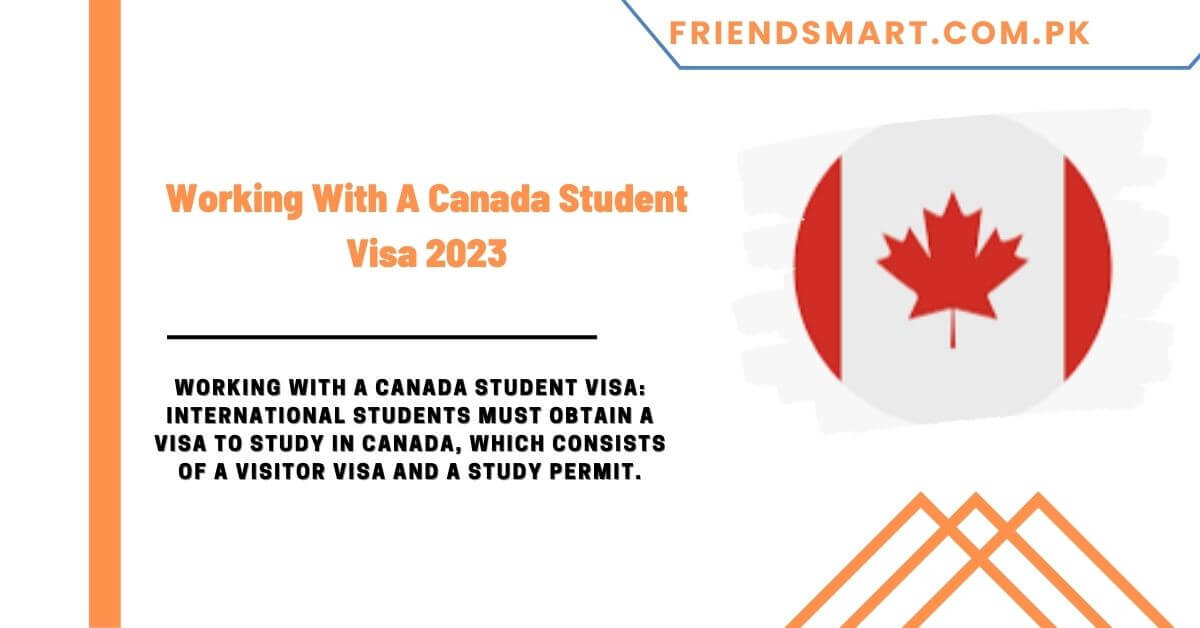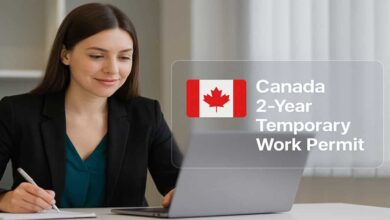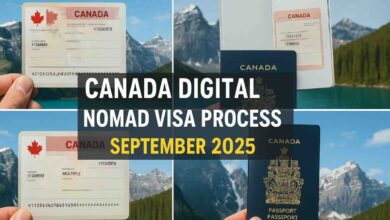Working With A Canada Student Visa 2023

Working With A Canada Student Visa: International students must obtain a visa to study in Canada, which consists of a visitor visa and a study permit. They must also enroll in what is known as Designated Learning Institutions (DLI). These are government-approved institutions that accept and enroll international students.
In any case, once you have obtained a student visa and permit, you will be able to complete your degree and obtain a Canadian diploma. However, some students wish to study and work in Canada at the same time. The reasons for this could range from gaining work experience in a Canadian workplace to simply supplementing their income with some extra work.
This article will go over the various options for students who have a student visa and want to work in Canada.
Can I work with a Student Work Permit?
Yes, students with student permits can work in Canada. Working time is only permitted while the visa and permits are valid, and in some cases, they must apply for additional student work permits.
Students can only work while their program is still in session and they have not graduated. If students want to work after they graduate, the process is different.

What are the ways I can work with a Student Work Permit in Canada?
The Canadian government anticipated that students would want to work while on a student visa, so they devised a variety of programs and methods to facilitate this. Depending on the circumstances, each working program has different requirements for students to meet as well as different application procedures.
Students can work in three ways while they have a student permit:
- Working on-campus at their respective universities.
- Working in other companies or places of employment away from campus.
- Completing a co-op or internship that their school requires.
We will go over each program and explain what it is and what the requirements are.
Working On-Campus with an International Student Work Permit
On-campus work entails working in the same location where you study. When working on campus, you do not need a student work permit and may begin working immediately if you meet the following requirements:
You are a full-time postsecondary student at one of these schools.
- A public college, university, or professional vocational school (Collège d’enseignement général et professionnel, or CEGEP) in any Canadian province.
- A private college or university in Quebec follows the same rules as public schools and receives at least 50% of its funding from the government.
- A private Canadian school that is legally permitted to grant degrees under provincial law.
You have a valid study permit as well as a visa.
You have a Social Insurance Number in Canada (SIN).
In Canada, you can only apply for a Social Insurance Number if your study permit states that you are permitted to work on-campus at the institution where you are completing your full-time studies under regulation R186(f), (v), or (w) (w). If your study permit does not include these conditions, you can request that the university and the government include them so that you can apply for the SIN. This procedure is free of charge, so you can do it whenever you want.
If you meet the requirements and have a valid job offer from an on-campus location, you may begin immediately and notify the Canadian Government only that you are engaged in a work contract. While attending classes on campus, you are only permitted to work 20 hours per week.
When you work on campus, you can do so in any building designated as an on-campus location. If your university has multiple campuses, you can work on any of them. Furthermore, if the school has any off-campus buildings, such as a library, research facility, or hospital, you can work in those as well.
Your official employer will be the school or university where you are enrolled, but you can work for anyone who is present on campus, such as:
- A member of the faculty.
- Any and all student organizations;
- A private company that operates on campus;
- A private contractor who provides services on the school’s campus;
Aside from these entities, you can choose to be self-employed at school by providing tutoring or other academically related services.
You are only permitted to work while studying full-time. When you finish your studies or your study permit expires, you must stop working.
Completing a Co-Op or Internship
Another option for working while studying in Canada is to complete a co-op or an internship. Many programs require co-ops or internships in order to obtain credits and a degree.
Working on campus is not the same as working off-campus in this case. While working on campus does not require an international student work permit, completing a co-op or internship does. This is because co-ops and internships are frequently completed away from campus.
Aside from having a co-op work permit, you must also meet the following criteria to be eligible for a co-op or internship:
- You must complete your program with a co-op or internship.
- The school you attend has written a letter stating that this requirement exists and that you must complete it in order to graduate.
- The required co-op or internship is 50% or less of the total time of your study program.
You are eligible to complete a co-op or internship with any program, but you cannot if you are enrolled in the following programs:
- English or French as a second language (ESL/FSL).
- general interest courses or preparatory courses before beginning another program of study;
How to Apply for the Co-op work permit?
You can apply for a co-op work permit online at the Government of Canada website, or you can submit your documents in person. The following forms must be submitted:
- IMM 5710 – Application to Modify My Status, Extend My Stay, or Remain in Canada as a Worker.
- IMM 5409 – Common-Law Union Statutory Declaration (if you have a common-law partner).
- IMM 5476 – Representative Use (if you are giving permission to someone to apply for you).
- IMM 5475 – Authorization to disclose personal information to a named individual (if you are using a representative).
You must also submit supporting documents in addition to these forms, such as:
- Your valid student visa and study permit;
- The letter from your school stating that a co-op or internship is required;
- Proof that the co-op or internship accounts for 50% or less of your program’s total time;
- Other documents, as required by the Canadian government;
After submitting the application, you must also pay the CAD$155 application fee. The Government of Canada will review your application and contact you with their decision. If they approve your work permit, you can begin working immediately to complete your co-op or internship.
Working Off-Campus
You may work off-campus in addition to working on campus or completing a co-op or internship if you meet the following requirements:
- You are in possession of a valid student visa and permit.
- You are either a full-time student at your school or a part-time student in your final semester.
- You are enrolled in a secondary-level vocational training program in Quebec or in any province’s post-secondary academic, professional, or vocational program.
- Your study permit contains conditions that allow you to work off-campus.
- You have a Social Security Number (SIN).
If you meet these requirements, you may work off-campus without a student work permit. However, if you meet the following criteria, you will require a student work permit:
- You are not permitted to work on or off campus during your studies, according to the terms of your study permit.
- You are enrolled in an English or French as a second language (ESL/FSL) program.
- You are taking general interest or prerequisite courses before enrolling in a full-time program.
If you require a student work permit, you must follow the same procedures as those for obtaining a work permit for a co-op or internship.
You may work off-campus for a maximum of 20 hours per week during regular academic classes, but you may work full-time during university holidays or breaks.
Can my spouse or common-law partner work while I am a student?
If your spouse or common-law partner is accompanying you in Canada while you finish your degree, they may work if the following conditions are met:
You are a full-time postsecondary student at one of the following schools:
- A public college, university, or professional vocational school (Collège d’enseignement général et professionnel, or CEGEP) in any Canadian province;
- A private college or university in Quebec that follows the same rules as public schools and receives at least 50% of its funding from the government;
- A private Canadian school that is legally permitted to award degrees under provincial law.
You are in possession of a valid study permit and visa;
Your spouse or common-law partner can apply online or in person by submitting the following forms along with proof that they meet the requirements outlined above:
- IMM 5710 – Application to Modify My Status, Extend My Stay, or Remain in Canada as a Worker.
- IMM 5409 – Common-Law Union Statutory Declaration.
- IMM 5476 – Use of Representative (if the spouse or common-law partner authorizes someone to apply on their behalf);
- IMM 5475 – Authorization to release personal information to a designated individual (if they are using a representative);
The application and fees must be submitted by the spouse or common-law partner. The application fee for the work permit is CAD$155, with an additional CAD$100 for the open work permit. If their work permit is approved by the government, they can begin working full-time anywhere they have a job offer. They can only work while you are still enrolled as a student.
Can I work after I complete my studies in Canada?
After finishing your studies in Canada, you may work off-campus through the Post-Graduate Work Program (PGWP). Visit our article on obtaining a Post Graduate Work Permit to learn more about the requirements and application process (PGWP).
Frequently Asked Questions
-
How many hours can students work in Canada in 2023?
You have the option of working up to 20 hours per week. Working more than 20 hours per week violates the terms of your study permit. You may lose your student status and be denied a study or work permit in the future if you do this. You may also be required to leave the country.
-
What is the success rate of Canada work visa 2023?
Canada Visa Ratio 2023. Canada Group Visa Approval Rate 99.9%.



